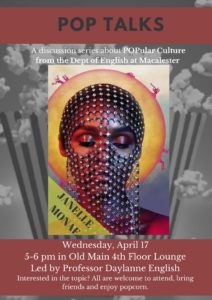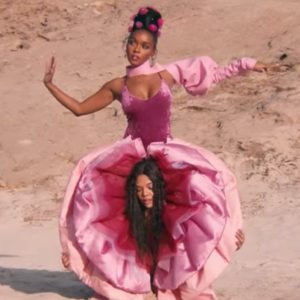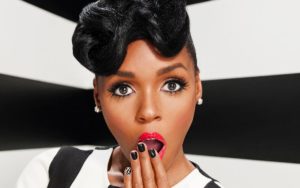Alex Harrington ’19
 If you’ve never been to one of the English Department’s Pop Talks, allow me to set the scene: it’s a Wednesday evening, the sun is setting. The Old Main fourth floor lounge, the most picturesque nook on campus, is warm as the shadows settle in. Friends gather at tables, laughing around mouths full of popcorn and Italian soda. Your favorite professor grabs a last bite of popcorn before calling the room to attention. The topic is something you haven’t encountered in a class, but that you’ve probably heard a lot about. Comic books or a recent movie open up and become valuable sites of academic inquiry as the professor shares their insights. Laughing resumes, this time around a conversation that ends only once people have to pack up for night classes. In short, Pop Talks are super fun, and if you haven’t been to any, you’re missing out.
If you’ve never been to one of the English Department’s Pop Talks, allow me to set the scene: it’s a Wednesday evening, the sun is setting. The Old Main fourth floor lounge, the most picturesque nook on campus, is warm as the shadows settle in. Friends gather at tables, laughing around mouths full of popcorn and Italian soda. Your favorite professor grabs a last bite of popcorn before calling the room to attention. The topic is something you haven’t encountered in a class, but that you’ve probably heard a lot about. Comic books or a recent movie open up and become valuable sites of academic inquiry as the professor shares their insights. Laughing resumes, this time around a conversation that ends only once people have to pack up for night classes. In short, Pop Talks are super fun, and if you haven’t been to any, you’re missing out.
Still not convinced? Well this month, Professor Daylanne English will lead a discussion on the iconic Janelle Monáe. If that’s not immediately exciting to you, here’s why it should be: In April 2018, after a successful year of acting in the Oscar-winning Moonlight (2016) and the Oscar-nominated Hidden Figures (2016), musical weirdo Monáe released her fourth album. For each album, Monáe stars in accompanying visuals, including a short film titled Many Moons for a track of the same name on her first album Metropolis: The Chase Suite (2008). Her fourth album, Dirty Computer, sees Monáe owning her acting skills in the eponymous 48 minute “emotion picture.” Previously, her discography was comprised of sci-fi/dystopian concept albums starring her alter-ego Cindi Mayweather. Dirty Computer follows suit as a dystopian story, but marked Monáe’s first move away from the android persona she’d embodied since her first album in 2008 and toward a more personal representation.
 Longtime fans of Monáe buzzed about the gay romance at the center of Dirty Computer’s narrative. Though speculation about her sexuality has been around as long as she’s been in the public eye (due in large part to her androgynous wardrobe), Monáe has always deflected questions about her love life with stock answers like “I only date androids.” In a Rolling Stone article that came out the day before the album was released, Monáe publicly came out as pansexual, saying that as “a queer black woman in America” and “someone who has been in relationships with both men and women,” she considers herself “to be a free-ass motherfucker.”
Longtime fans of Monáe buzzed about the gay romance at the center of Dirty Computer’s narrative. Though speculation about her sexuality has been around as long as she’s been in the public eye (due in large part to her androgynous wardrobe), Monáe has always deflected questions about her love life with stock answers like “I only date androids.” In a Rolling Stone article that came out the day before the album was released, Monáe publicly came out as pansexual, saying that as “a queer black woman in America” and “someone who has been in relationships with both men and women,” she considers herself “to be a free-ass motherfucker.”
Janelle Monáe tackles the intersection of race, gender, and sexuality in electrifyingly creative ways. Her work is rife with artistic reference and bold proclamations. In terms of an entry to academic discussion, her presence and career so far present a wealth of options. Professor English, though hoping people will come with their own interests and questions about Monáe, gave me a preview of her points of intrigue. She wants to dissect Monáe’s work in relation to queer theory, specifically “the ways that Monáe challenges and represents queer alternatives” to Lee Edelman’s concept of ‘reproductive futurism.’ Professor English also wants to look at Monáe’s “politically enabling deployment of the queer and the weird,” and “inclusive representation of Black womanhood and black women’s queerness.”

The Pop Talk promises to be not only fun and engaging, but interdisciplinary and illuminating. And who could turn that down free snacks?
Save the date for April 17 at 5 p.m. and come up to the Old Main fourth floor lounge. All are welcome, androids or otherwise.